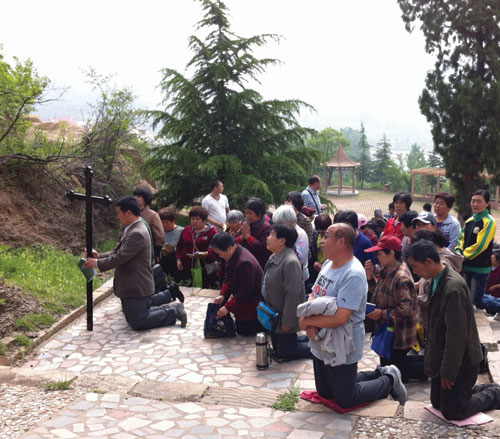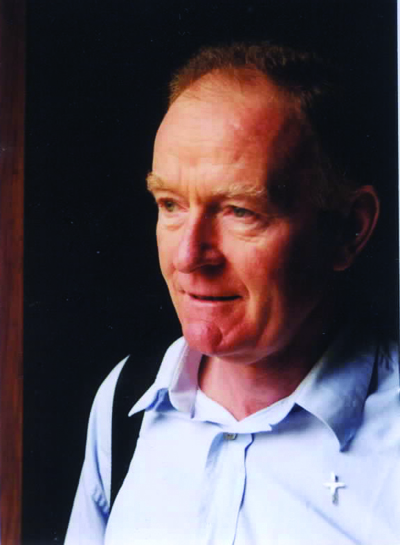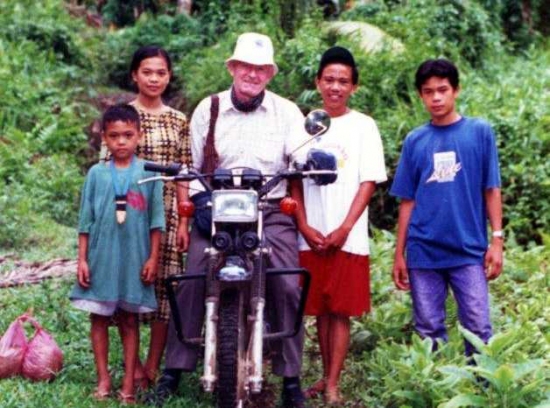A Tale of Two Communities
By Fr Cireneo Matulac

One of the communities in China visited by Fr Matulac
The author is from Payao, Zamboanga Sibugay, in southwest Mindanao. While a seminarian he spent two years on First Mission Assignment in Chile. After his ordination he went on mission to China. He is now Vice-Rector at the Columban House of Studies in Cubao, Quezon City. He has contributed a number of articles to MISYONonline.com over the years.
Recently I visited some small Catholic communities in the north of China. I visited one particular community, with little more than ten families gathered together, with the Parish Priest. He asked me to give a short talk to the congregation while he was hearing confessions. I thought I would say something on reconciliation and forgiveness. I introduced myself as a missionary priest from the Philippines, a member of the Missionary Society of St Columban.
Columbans work in many places in Asia: China, Korea, Pakistan, Taiwan and the Philippines. I spoke to them of the ministry of reconciliation between Muslims and Christians in Mindanao.

Fr Rufus Halley
I told the story of Fr Rufus Halley, an Irish Columban who had spent many years working among the Muslims. He was known for his work as a peace-builder and was loved by the people. However, on 28 August 2001, while riding his motorbike from an interfaith meeting in Balabagan, Lanao del Sur, back to his nearby parish, Malabang, a group of armed men stopped him and tried to kidnap him. He refused to go with them. They tried dragging him, but he resisted and eventually they shot him and he died on the spot. His body was left on the road. Both communities of the parish, Christian and Muslim, were deeply saddened by this event. All of them had lost a good friend.

Fr Rufus Halley with young friends
A month later, three people were arrested as suspects for his murder. It turned out that they were Muslims. Friends of Father Rufus who used to visit the local prison sat down together to decide whether they would visit those arrested for killing him.
As I told this story to the members of the Chinese community, I asked them, ‘Should these friends of Father Rufus have visited those accused of killing him?’ One woman stood and said that as a Christian one should visit, but it would be so difficult that she was not sure if she could do it herself. The hurt would be just too deep. Another said much the same thing. A man said that he would encourage the friends to visit those accused, because Jesus had said ‘Love your enemies’.
As the discussion went on it became clear that the gathered community agreed on what should be done, but questioned whether they themselves would have the strength or the courage to forgive. As I listened I told them that Father Rufus’s friends had had a similar discussion and had come to the conclusion that he would want them to visit. So they did go and visit the accused. This was certainly a great act of forgiveness. Our ability to forgive those who have done us wrong is the first step towards reconciliation. When we are ready to forgive our enemy, we give reconciliation a chance.
Columban Frs Cireneo Matulac, Kevin McHugh and Leo Distor
Fr McHugh worked for many years in Balabagan.
After our discussion, a man at the rear of the room raised his hand and said that he too had a story to tell. In his home village, during China’s Cultural Revolution (1966 – 1976), there was a man who denounced the Christians of the village and was responsible for much destruction. This man burned the Catholic church in the village and denounced the chief catechist so that the latter was imprisoned for a very long time. In the 1980s the chief catechist was eventually released from prison. The man who had denounced him was by now old and seriously ill. Since he was known for his tyranny, the neighbors simply ignored him. His sickness brought this man much physical pain. The man he had denounced and had served such a long prison sentence went to visit him. Despite his previous suffering he was willing to forgive. He even persuaded his friends to visit him also.
Because of this kindness, the sick man asked why he was doing this. The catechist replied that this was the essence of Christianity: we were to forgive even as God forgives. Eventually, the sick man on receiving such care, concern and forgiveness from his neighbors decided to become a Catholic himself. I found this a very profound story of reconciliation: an instance where a community who had endured communal conflict had received the grace to be reconciled when the violence was over.
All Christians are called to respond to Christ’s command, ‘Go into all the world and proclaim the good news to the whole creation’ (Mark 16:15). How do we proclaim the Good News? I think that these two stories show us that we proclaim the gospel above all by the way we live our Christian lives. God’s work in us must be evident in the quality of our daily lives.
This article first appeared in the September-October 2015 issue of Far East, the magazine of the Columbans in Ireland and Britain.
‘Rufus’s death will influence a great number of people’‘Rufus’s death will influence a great number of people to continue the great work that he has been involved with.’ These words of one of the brothers of Fr Rufus Halley in the AP report above were fulfilled in the Catholic community that Fr Cireneo Matulac visited in China. ‘Mercy is the heart of God. It must also be the heart of the members of the one great family of his children: a heart which beats all the more strongly wherever human dignity – as a reflection of the face of God in his creatures – is in play. Jesus tells us that love for others – foreigners, the sick, prisoners, the homeless, even our enemies – is the yardstick by which God will judge our actions. Our eternal destiny depends on this.’ (Pope Francis, Message for World Day of Peace, 1 January 2016).
You may read the tribute to Fr Rufus Halley by his close friend Gaudencio B. Cardinal Rosales, Archbishop Emeritus of Manila, here. |

